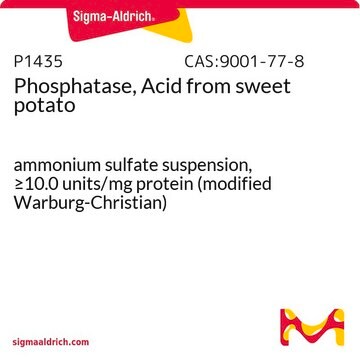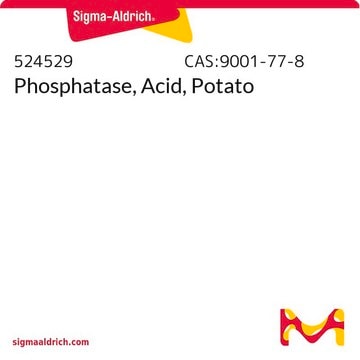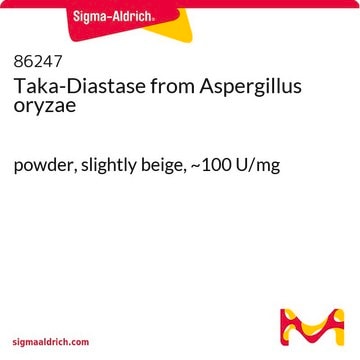P3627
Phosphatase, Acid from wheat germ
≥0.4 unit/mg solid
Synonym(s):
(Orthophosphoric-monoester phosphohydrolase [acid optimum] ), Acid Phosphatase from wheat germ
About This Item
Recommended Products
form
powder
Quality Level
specific activity
≥0.4 unit/mg solid
mol wt
58 kDa by gel filtration
storage temp.
−20°C
SMILES string
O(CC(O)C)CC#C
InChI
1S/C6H10O2/c1-3-4-8-5-6(2)7/h1,6-7H,4-5H2,2H3
InChI key
GZCWLCBFPRFLKL-UHFFFAOYSA-N
Looking for similar products? Visit Product Comparison Guide
Application
Biochem/physiol Actions
Quality
Unit Definition
Preparation Note
Signal Word
Danger
Hazard Statements
Precautionary Statements
Hazard Classifications
Resp. Sens. 1
Storage Class Code
11 - Combustible Solids
WGK
WGK 3
Flash Point(F)
Not applicable
Flash Point(C)
Not applicable
Personal Protective Equipment
Choose from one of the most recent versions:
Certificates of Analysis (COA)
Don't see the Right Version?
If you require a particular version, you can look up a specific certificate by the Lot or Batch number.
Already Own This Product?
Find documentation for the products that you have recently purchased in the Document Library.
Customers Also Viewed
Protocols
Enzymatic Assay of Acid Phosphatase (EC 3.1.3.2)
Our team of scientists has experience in all areas of research including Life Science, Material Science, Chemical Synthesis, Chromatography, Analytical and many others.
Contact Technical Service













